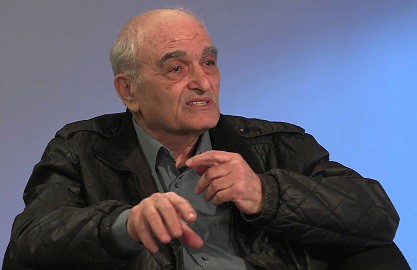The disgraceful expulsion of Moshé Machover from the Labour Party
 The veteran Jewish socialist Moshé Machover has been expelled from the Labour Party. This week he received a letter from Sam Matthews, the party’s Head of Disputes, informing him that his membership had been terminated.
The veteran Jewish socialist Moshé Machover has been expelled from the Labour Party. This week he received a letter from Sam Matthews, the party’s Head of Disputes, informing him that his membership had been terminated.
Outrageously, the charges against Moshé include the allegation that he is responsible for writing “an apparently antisemitic article”. This is a reference to a speech originally made by Moshé in May last year, in response to the launch of a hysterical witch-hunt over antisemitism in the Labour Party that had resulted in the suspension of Ken Livingstone. An updated version of Moshé’s speech was published in the Labour Party Marxists newsletter and distributed at party conference last week.
Disciplinary action against Moshé was obviously provoked by the media furore over his quotation of Reinhard Heydrich’s 1935 statement that the Nazi regime found itself in “complete agreement with the great spiritual movement within Jewry itself, the so-called Zionism, with its recognition of the solidarity of Jewry throughout the world and the rejection of all assimilationist ideas”.
As I’ve previously pointed out, the source of that quotation is in fact The Third Reich and the Palestine Question by Francis Nicosia, who is Professor of Holocaust Studies at the University of Vermont and the recognised academic expert on Nazi policy towards Zionism. I suppose it’s just as well Professor Nicosia isn’t a member of the Labour Party himself, otherwise he would presumably be subject to disciplinary action along with Moshé.
The expulsion letter claims that Moshé’s article “appears to meet the International Holocaust Remembrance Alliance definition of antisemitism, which has been adopted by the Labour Party”.
But the IHRA “working definition” reads as follows: “Antisemitism is a certain perception of Jews, which may be expressed as hatred toward Jews. Rhetorical and physical manifestations of antisemitism are directed toward Jewish or non-Jewish individuals and/or their property, toward Jewish community institutions and religious facilities.” It’s quite clear that nothing Moshé has written qualifies as antisemitism under that definition.
Maybe Sam Matthews is referring not just to the actual IHRA definition but to the highly controversial list of examples which it is claimed “could, taking into account the overall context” amount to antisemitism. But that list has not, so far as I’m aware, been supported by the Labour Party — just the basic definition.
A particularly worrying aspect of the expulsion letter is that Matthews declares it is incompatible with party membership to use “language that may be perceived as provocative, insensitive or offensive” (emphasis added). But Clause 2.1.8 of the party rules, which Moshé is accused of breaching, contains no such provision.
Matthews’ formulation echoes an amendment to party rules proposed by the Jewish Labour Movement, according to which an antisemitic incident would be “defined as something where the victim or anyone else think it was motivated by hostility or prejudice” (emphasis added). But JLM remitted that proposed rule change, no doubt because they knew there was no chance of getting it through party conference. Delegates would have rejected the adoption of a disciplinary procedure that allowed members to be convicted of an offence based merely on someone thinking that an incident was antisemitic, without any objective evidence being required.
According to the new Clause 2.1.8 that was adopted at conference, before disciplinary sanctions can be imposed on a party member over alleged antisemitism it is necessary to establish that their behaviour “might reasonably be seen to demonstrate hostility or prejudice”. In other words, it is not enough for someone to perceive that an incident is antisemitic and be offended by it; it is necessary for the party to establish that the perception has a reasonable basis.
Judging by his letter to Moshé, the Labour Party’s Head of Disputes has decided to ignore that rule, because there is of course nothing Moshé has said or done that “might reasonably be seen to demonstrate hostility or prejudice” towards Jews. Instead, Matthews is apparently trying to introduce the JLM’s abandoned rule change through the back door. According to him, Moshé has opened himself up to disciplinary action because he has written articles that are “perceived as provocative, insensitive or offensive” by Zionists who don’t like to be reminded about embarrassing episodes from the history of Zionism.
Furthermore, and this is what is particularly scandalous about the Labour Party’s actions, Moshé will not have an opportunity to defend himself against the ridiculous charge of promoting antisemitism. Having attacked his reputation by disgracefully smearing him as a racist, Matthews’ letter goes on to state that Moshé will not be “placed under formal notice of investigation so as to properly investigate these allegations”.
This is because, the letter informs him, he has been summarily expelled from the party on the basis of his association with the CPGB/Weekly Worker group. No evidence of Moshé’s membership of the group or support for their programme is presented. His expulsion is justified solely on the grounds that he has participated in their events and contributed to their newspaper.
Anyone who hoped that the recommendations in the Chakrabarti report would result in the Labour Party following disciplinary procedures that are in line with natural justice was obviously being over-optimistic.
First published on Medium in October 2017